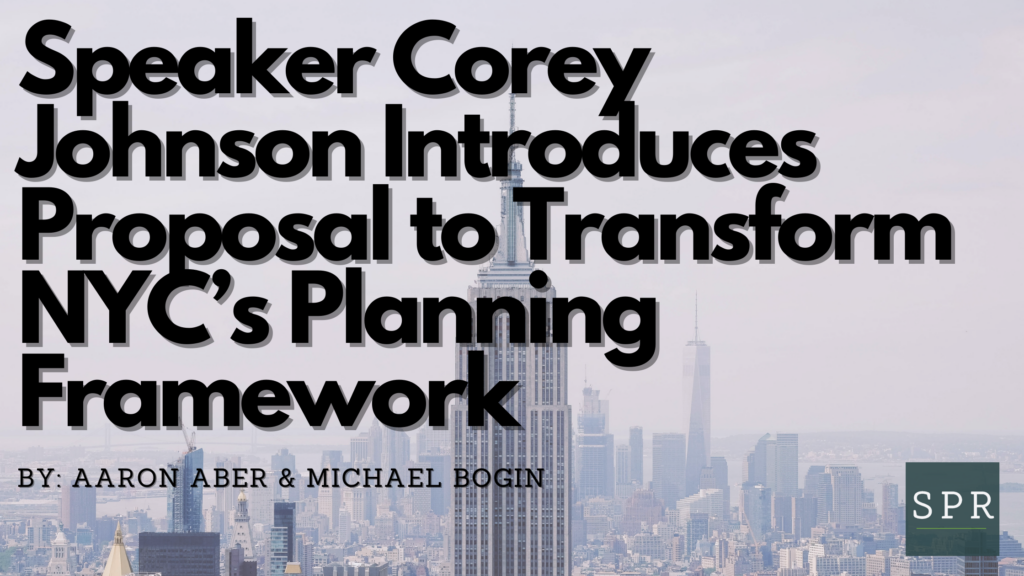Blog

NYC Council Speaker Corey Johnson Introduces Proposal to Transform Land Use Planning
At the New York City Council’s last meeting of 2020, City Council Speaker Corey Johnson introduced proposed legislation that would, if passed, overhaul New York City’s land use planning framework. The legislation, accompanied by a report entitled Planning Together: A New Comprehensive Planning Framework for New York City, would create a ten-year comprehensive planning cycle for the City. The legislation seeks to address the City’s lack of a comprehensive plan, which the report argues has historically harmed poor neighborhoods and communities of color.
There is currently no comprehensive citywide land-use planning framework. The report describes the City’s current process as fragmented, with poor coordination and insufficient opportunities for public involvement. There is also no framework to address socioeconomic disparities across different communities. Instead, the report posits, zoning and land use changes occur on a neighborhood-by-neighborhood basis, allowing wealthier, Whiter, and more well-connected neighborhoods to protect themselves from unwanted development that ends up impacting poorer and predominantly non-White communities instead.
According to the 2019 Charter Revision Commission’s Preliminary Staff Report, which is cited in the report issued by Speaker Johnson, there are currently at least 12 documents and plans that could be considered part of the City’s planning process. These include Borough- and City-level strategic policy statements, community development plans, zoning and planning reports, statements of need, sustainability reports, and capital expenditure reports. Speaker Johnson’s plan is aimed at streamlining these various planning elements into a single process. Johnson has proposed that the City engage in the following steps to implement the details of this new procedure:
- A “Conditions of the City” report by the Mayor’s Office of Long-Term Planning and Sustainability to identify key issues.
- A “Citywide Goals Statement” that would address socioeconomic disparities by setting Measurable Citywide Targets and District Level Targets for “housing, jobs, open space, resiliency infrastructure, City facilities, schools, transportation, public utilities, and other infrastructure.”
- A Long-Term Plan that would include preferred land use scenarios for each Community District as well as citywide policies and would accommodate District Level Targets. The City Planning Commission would determine if an individual land use application submitted under the Unified Land Use Review Procedure, codified at Charter Section 197-a, is consistent with the Long-Term Plan. The Council would only be required to vote on projects that conflict with the Long-Term Plan and could “call up” applications approved by the City Planning Commission but that the Council believes are inconsistent with the Long-Term Plan.
- A Generic Environmental Impact Statement issued along with the Long-Term Plan, allowing projects consistent with the Long-Term Plan to perform only supplemental City Environmental Quality Review.
Although Johnson’s proposal has support among many of his City Council colleagues, it will prove challenging to overhaul the City’s deeply entrenched planning and land use practices. The legislation would require revisions to the City Charter, such as requiring the “Citywide Goals Statement” to reduce socioeconomic disparities and integrating the existing patchwork of planning requirements. Sive, Paget & Riesel will continue to track the legislation and provide updates as the plan takes shape.